Marc Tyler Nobleman's Blog, page 79
June 14, 2014
“Addicted to Love” women: first reunion since 1986 shoot!
Last year, I became the first person to track down and interview all five women from the iconic Robert Palmer “Addicted to Love” video.
Last night, all five reunited for the first time since the 1986 shoot. (One came in from the U.S. and one from Thailand; the other three are in the UK, where they met up.)
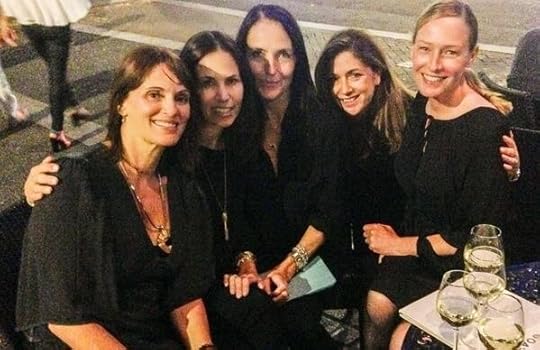 Julie, Patty, Kathy, Julia, Mak, wine
Julie, Patty, Kathy, Julia, Mak, wine
Gonna have to face it...that is totally cool.
Last night, all five reunited for the first time since the 1986 shoot. (One came in from the U.S. and one from Thailand; the other three are in the UK, where they met up.)
 Julie, Patty, Kathy, Julia, Mak, wine
Julie, Patty, Kathy, Julia, Mak, wineGonna have to face it...that is totally cool.
Published on June 14, 2014 09:59
“Wonder Woman” theme singer interview (2 of 2): Julia Waters
Interview with lead singer on Wonder Woman, John Bähler.
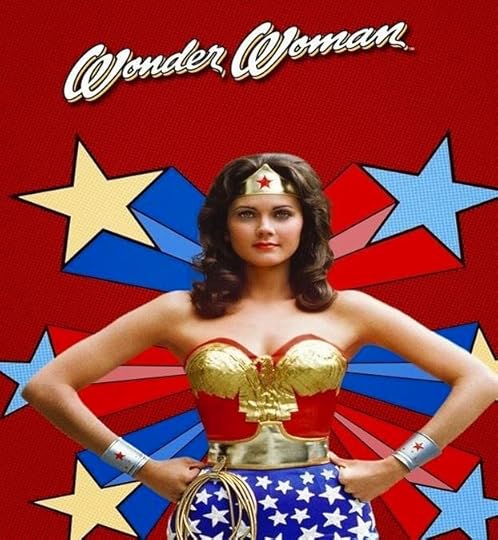
How old were you when you sang on the theme song for season 1 of Wonder Woman?
A lady never tells her age!
What else were you doing professionally at the time?
Along with my family, I was busy doing other session work: records, movies, commercials, and other television sitcoms.
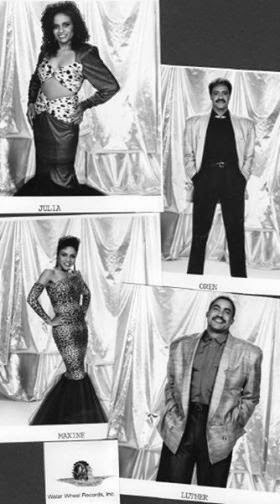 Julia (top left), 1970s
Julia (top left), 1970s
Where were you living at the time?
Los Angeles.
How were you hired?
John Bähler was the contractor for the session and he hired me along with Marti [McCall] and Carolyn [Willis].
Were you a Wonder Woman fan?
I loved Wonder Woman. Before the TV show, I enjoyed reading the comic books of superheroes: Wonder Woman, Batman, Superman.
Any funny stories from the recording?
I don’t recall any funny stories. I just remember having a good time working with the other singers.
What did you think of the song?
I liked the song and still do.
What did you think of the show?
I enjoyed the show. I liked the idea of a woman superhero.
Did you ever meet Lynda Carter, and if so, how was that?
Never met her.
What were you paid?
I was paid union scale; don’t recall how much that was back then. Still receive a few small residuals from the show.
What are your most cherished/funniest Wonder Woman stories since (a reaction when someone you meet discovers you were the theme song singer, etc.)?
I don’t have any stories to tell. As I said before, Wonder Woman was just one of the many projects that I was blessed to have sang on.
What are you doing these days?
I still stay very busy doing what I do. My family The Waters were featured in the Oscar-winning 20 Feet from Stardom. We also received the Ella Voice Award 2014 [from the] SOS (Society of Singers). Some of the most recent artists that I have work with are Adele, Pet Shop Boys, Noah and the Whale, Muse, Neil Diamond, Rod Stewart, Alfie Boe, just to name a few. I am also a member of Neil Diamond’s touring band. I feel very blessed to still find myself in the mix.
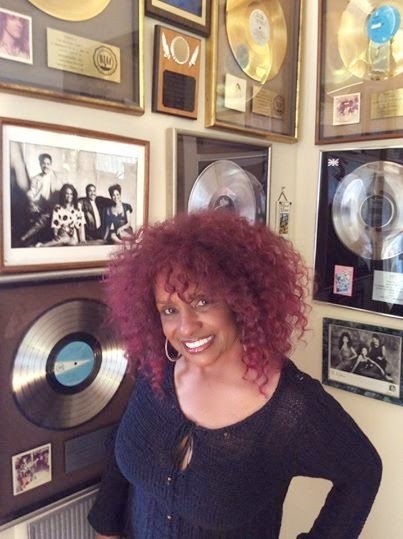
What do you consider your career highlight to date?
Still being able to work in an industry doing what I love to do—using my God-given talent to make music.
Where do you live?
I live in the Los Angeles area.
If you have kids, how many/how old and what do they think of your Wonder Woman role?
I have one daughter. Don’t know if she has given it any thought. She is used to me doing a lot of great things.
What did you think when you first heard from me?
Don’t quite understand what you mean by the question.
Has anyone else ever interviewed about this? If so, when and for what publication?
No!
Have you appeared at any fan conventions to sign autographs? If not, would you?
No! [MTN: I suspect that refers to the first, not second, question.]
How do you look back on the experience?
To be honest with you, I looked at it as a blessing for another pay day, although I enjoyed the Wonder Woman series. I always enjoy working on new projects.

How old were you when you sang on the theme song for season 1 of Wonder Woman?
A lady never tells her age!
What else were you doing professionally at the time?
Along with my family, I was busy doing other session work: records, movies, commercials, and other television sitcoms.
 Julia (top left), 1970s
Julia (top left), 1970sWhere were you living at the time?
Los Angeles.
How were you hired?
John Bähler was the contractor for the session and he hired me along with Marti [McCall] and Carolyn [Willis].
Were you a Wonder Woman fan?
I loved Wonder Woman. Before the TV show, I enjoyed reading the comic books of superheroes: Wonder Woman, Batman, Superman.
Any funny stories from the recording?
I don’t recall any funny stories. I just remember having a good time working with the other singers.
What did you think of the song?
I liked the song and still do.
What did you think of the show?
I enjoyed the show. I liked the idea of a woman superhero.
Did you ever meet Lynda Carter, and if so, how was that?
Never met her.
What were you paid?
I was paid union scale; don’t recall how much that was back then. Still receive a few small residuals from the show.
What are your most cherished/funniest Wonder Woman stories since (a reaction when someone you meet discovers you were the theme song singer, etc.)?
I don’t have any stories to tell. As I said before, Wonder Woman was just one of the many projects that I was blessed to have sang on.
What are you doing these days?
I still stay very busy doing what I do. My family The Waters were featured in the Oscar-winning 20 Feet from Stardom. We also received the Ella Voice Award 2014 [from the] SOS (Society of Singers). Some of the most recent artists that I have work with are Adele, Pet Shop Boys, Noah and the Whale, Muse, Neil Diamond, Rod Stewart, Alfie Boe, just to name a few. I am also a member of Neil Diamond’s touring band. I feel very blessed to still find myself in the mix.

What do you consider your career highlight to date?
Still being able to work in an industry doing what I love to do—using my God-given talent to make music.
Where do you live?
I live in the Los Angeles area.
If you have kids, how many/how old and what do they think of your Wonder Woman role?
I have one daughter. Don’t know if she has given it any thought. She is used to me doing a lot of great things.
What did you think when you first heard from me?
Don’t quite understand what you mean by the question.
Has anyone else ever interviewed about this? If so, when and for what publication?
No!
Have you appeared at any fan conventions to sign autographs? If not, would you?
No! [MTN: I suspect that refers to the first, not second, question.]
How do you look back on the experience?
To be honest with you, I looked at it as a blessing for another pay day, although I enjoyed the Wonder Woman series. I always enjoy working on new projects.
Published on June 14, 2014 04:00
June 13, 2014
“Wonder Woman” theme singer interview (1 of 2): John Bähler
In your satin tights
Fighting for your rights
And the old Red, White, and Blue
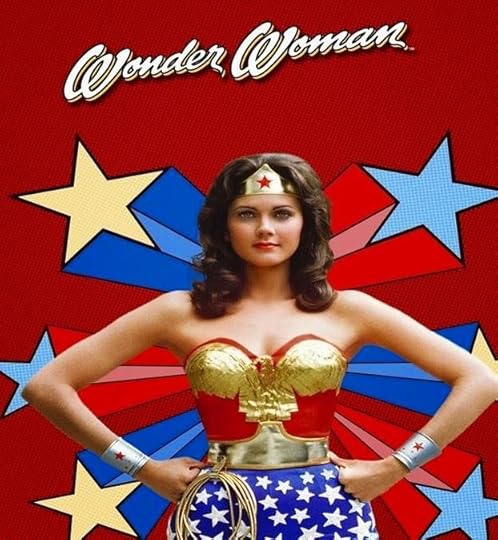
For a while now, I’ve been interested in finding and interviewing the singer(s) of the iconic theme to the 1970s Wonder Woman TV show (1975-1979).
Thanks to Pat Evans, I learned the name of the male lead—John Bähler—and thanks to John, I learned of the background singers. One, Marti McCall, has passed away. Another, Carolyn Willis (70 this year and retired), did not respond to repeated requests. But the third, Julia Waters, gave an interview.
First, here is John’s:
How old were you when you sang lead on the theme song for season 1 of Wonder Woman ?
I was in my late 20s, maybe 28?
What else were you doing professionally at the time?
I was a “first call” studio singer and arranger. I was fortunate to have a pretty full schedule even though I was freelance.
Where were you living?
I think I was living in Studio City, California.
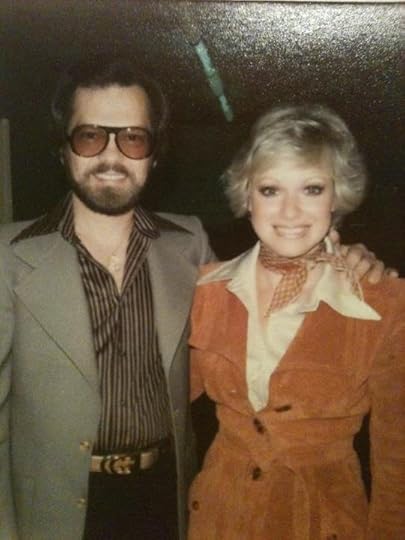 John and wife Janet Lennon, mid-1970s
John and wife Janet Lennon, mid-1970s
How were you hired?
I knew Charles Fox from other TV themes I had sung for him and I think he called me directly.
Who were the other singers on the song?
Julia Waters-Tillman, Maxine Waters, and I believe Carolyn Willis was the third girl. [NOTE: According to Julia Waters-Tillman, the third was not her sister Maxine but rather Marti McCall, who, as mentioned, has passed away.]
Any funny stories from the recording?
Not really. Yes we had fun because we loved what we did for a living, but I recall being on a huge sound stage at one of the major companies (could have been Warner Bros.) and we were under a time restriction (as all sessions were) so we just got down to business and got the job done.
 1970s (John second from right)
1970s (John second from right)
What did you think of the song?
I love all Charlie Fox’s compositions. He is the best. The song actually “sang itself,” meaning that it was easy to sing in our part and invited us to use all of the energy we could muster. I think the performance shows that.
What did you think of the show?
Lynda Carter was a terrific Wonder Woman, however I was so busy doing recording sessions (movies, TV shows, and record dates) that I had little time to watch television.
Did you ever meet Lynda Carter, and if so, how was that?
Unfortunately I never me Lynda. Wish I had!
What were you paid?
Union scale with residuals. We always worked for “scale.” It was simply what we did.
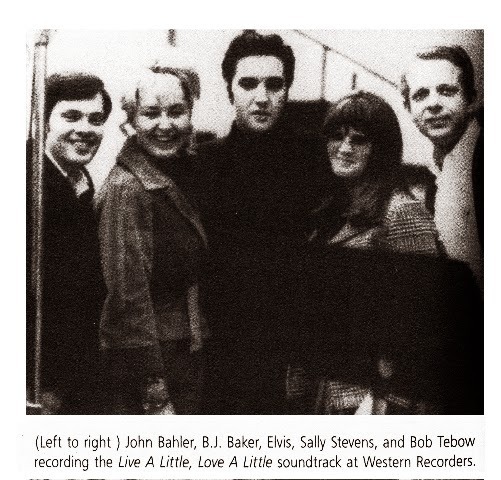 with Elvis Presley, circa 1968
with Elvis Presley, circa 1968
Any photos from the recording?
I don’t have any pics from the recording (wish I did).
What are your most cherished/funniest Wonder Woman stories since (a reaction when someone you meet discovers you were the theme song singer, etc.)?
The reaction I get more than any other is a greater respect for me when people find out. It’s sad but true. However, I’ll take all of the respect I can get no matter how it comes!
What are you doing these days?
I’m semi-retired. I’ve been doing portrait photography for the last ten years and am considering retiring from that. I still do backup singing when I can and I still do quite a bit or arranging, both vocal and instrumental.
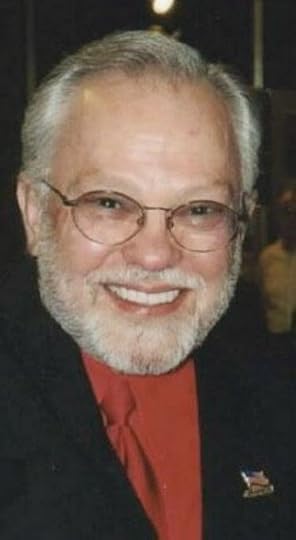
What do you consider your career highlight to date?
There are too many to pick one; however, one session stands out. I got a call to be at Paramount Studio M for a movie with Elmer Bernstein. When I got to the studio, I was chatting with several of the musicians I knew and when it was time for the session to start, I realized that I didn’t see any other singers there!
I walked into this gigantic sound stage with an orchestra of 50 or 60 and I noticed a small vocal booth set up between the French horn and trombone section. There I was, on my own, inside a small vocal booth with a microphone and a music stand smack dab in the middle of this huge orchestra. Elmer had written a part for me to enhance the trombones and French horn.
When at the end of the session I was reminded that there never had to be a re-take because of me, I really thought I had “made it” as a musician! How thrilling is that! And the really sad thing is…I don’t remember the name of the movie!
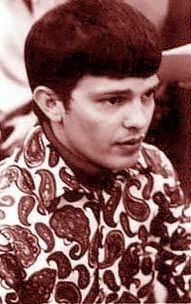 late 1960s
late 1960s
Where do you live?
We moved to Branson, Missouri over 20 years ago and we love it.
If you have kids, how many/how old and what do they think of your Wonder Woman role?
We have five children (our oldest is 50 and our youngest is 43), 12 grandchildren, and one great-grandchild. I think my kids are proud of me and the various recordings in which I’ve been a part. I sure hope so.
What did you think when you first heard from me?
I was flattered! I’ve found that if you live long enough people will find things about your career and be inquisitive. I’m super proud of that.
Has anyone else ever interviewed about this? If so, when and for what publication?
Not specifically for Wonder Woman.
Have you appeared at any fan conventions to sign autographs? If not, would you?
No, I haven’t but I would be happy to if invited.
How do you look back on the experience?
It was one of many like experiences. I look back with pride knowing I did my very best.
Anyone else connected with Wonder Woman you suggest I interview?
Not that I’m aware of.
Anything you’d like to add?
I would like to thank you for caring enough to ask me to do this interview. It’s kinda nice going back in time and remembering how special it was.
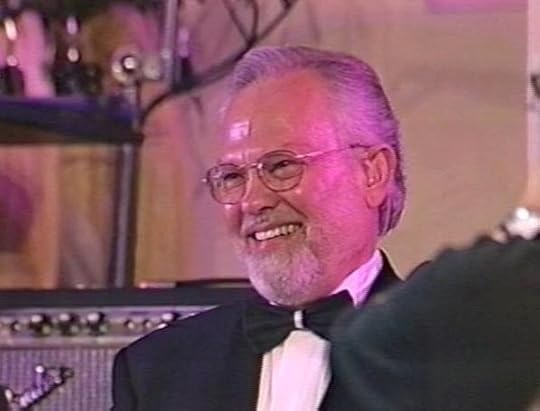
Fighting for your rights
And the old Red, White, and Blue

For a while now, I’ve been interested in finding and interviewing the singer(s) of the iconic theme to the 1970s Wonder Woman TV show (1975-1979).
Thanks to Pat Evans, I learned the name of the male lead—John Bähler—and thanks to John, I learned of the background singers. One, Marti McCall, has passed away. Another, Carolyn Willis (70 this year and retired), did not respond to repeated requests. But the third, Julia Waters, gave an interview.
First, here is John’s:
How old were you when you sang lead on the theme song for season 1 of Wonder Woman ?
I was in my late 20s, maybe 28?
What else were you doing professionally at the time?
I was a “first call” studio singer and arranger. I was fortunate to have a pretty full schedule even though I was freelance.
Where were you living?
I think I was living in Studio City, California.
 John and wife Janet Lennon, mid-1970s
John and wife Janet Lennon, mid-1970sHow were you hired?
I knew Charles Fox from other TV themes I had sung for him and I think he called me directly.
Who were the other singers on the song?
Julia Waters-Tillman, Maxine Waters, and I believe Carolyn Willis was the third girl. [NOTE: According to Julia Waters-Tillman, the third was not her sister Maxine but rather Marti McCall, who, as mentioned, has passed away.]
Any funny stories from the recording?
Not really. Yes we had fun because we loved what we did for a living, but I recall being on a huge sound stage at one of the major companies (could have been Warner Bros.) and we were under a time restriction (as all sessions were) so we just got down to business and got the job done.
 1970s (John second from right)
1970s (John second from right)What did you think of the song?
I love all Charlie Fox’s compositions. He is the best. The song actually “sang itself,” meaning that it was easy to sing in our part and invited us to use all of the energy we could muster. I think the performance shows that.
What did you think of the show?
Lynda Carter was a terrific Wonder Woman, however I was so busy doing recording sessions (movies, TV shows, and record dates) that I had little time to watch television.
Did you ever meet Lynda Carter, and if so, how was that?
Unfortunately I never me Lynda. Wish I had!
What were you paid?
Union scale with residuals. We always worked for “scale.” It was simply what we did.
 with Elvis Presley, circa 1968
with Elvis Presley, circa 1968Any photos from the recording?
I don’t have any pics from the recording (wish I did).
What are your most cherished/funniest Wonder Woman stories since (a reaction when someone you meet discovers you were the theme song singer, etc.)?
The reaction I get more than any other is a greater respect for me when people find out. It’s sad but true. However, I’ll take all of the respect I can get no matter how it comes!
What are you doing these days?
I’m semi-retired. I’ve been doing portrait photography for the last ten years and am considering retiring from that. I still do backup singing when I can and I still do quite a bit or arranging, both vocal and instrumental.

What do you consider your career highlight to date?
There are too many to pick one; however, one session stands out. I got a call to be at Paramount Studio M for a movie with Elmer Bernstein. When I got to the studio, I was chatting with several of the musicians I knew and when it was time for the session to start, I realized that I didn’t see any other singers there!
I walked into this gigantic sound stage with an orchestra of 50 or 60 and I noticed a small vocal booth set up between the French horn and trombone section. There I was, on my own, inside a small vocal booth with a microphone and a music stand smack dab in the middle of this huge orchestra. Elmer had written a part for me to enhance the trombones and French horn.
When at the end of the session I was reminded that there never had to be a re-take because of me, I really thought I had “made it” as a musician! How thrilling is that! And the really sad thing is…I don’t remember the name of the movie!
 late 1960s
late 1960sWhere do you live?
We moved to Branson, Missouri over 20 years ago and we love it.
If you have kids, how many/how old and what do they think of your Wonder Woman role?
We have five children (our oldest is 50 and our youngest is 43), 12 grandchildren, and one great-grandchild. I think my kids are proud of me and the various recordings in which I’ve been a part. I sure hope so.
What did you think when you first heard from me?
I was flattered! I’ve found that if you live long enough people will find things about your career and be inquisitive. I’m super proud of that.
Has anyone else ever interviewed about this? If so, when and for what publication?
Not specifically for Wonder Woman.
Have you appeared at any fan conventions to sign autographs? If not, would you?
No, I haven’t but I would be happy to if invited.
How do you look back on the experience?
It was one of many like experiences. I look back with pride knowing I did my very best.
Anyone else connected with Wonder Woman you suggest I interview?
Not that I’m aware of.
Anything you’d like to add?
I would like to thank you for caring enough to ask me to do this interview. It’s kinda nice going back in time and remembering how special it was.

Published on June 13, 2014 04:00
June 12, 2014
“Super Boys,” Super Brad
Brad Ricca is a time traveler.
Reading his 2013 book Super Boys (newly out in paperback), you can practically smell the 1930s.
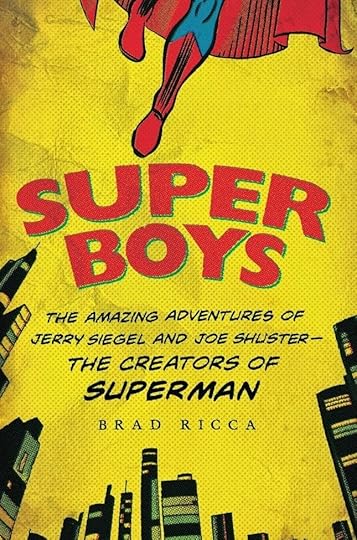
His research is exacting and his manner of presenting it manages to be both detailed and fast-paced (sometimes the former can trip up the latter). I love time travel, and obvs I love Superman, so put them together and I’m hooked (except in a few Imaginary Stories).
If you’re a superhero fan, you should pick this up. If you’re a Superman fan, you must pick this up.
If you root for the underdogs, you’ll find them here—sometimes. To be sure, Jerry and Joe suffered immeasurably over many years, but they did fight for—and ultimately get—a steady income stream, plus they died with their names attached to their big idea. This was more than many of their colleagues could say. Brad portrays Jerry and Joe with tremendous respect, which means he sometimes has to share unpleasant truths about them.
Disclosure: Brad and I are friends. He was one of the most impactful people I met while researching my own Siegel and Shuster book, Boys of Steel: The Creators of Superman. But this is less a traditional review than a fannish (and selective, and overdue) dissection of his important book, which makes me eligible for bias.
Boys of Steel came out in 2008. Hard as this still is to believe, it was the first standalone biography of writer Jerry Siegel and artist Joe Shuster. However, Brad had already been at work on his more comprehensive book for years. (I know the feeling; I wrote Boys of Steel in 2004. Publishing takes a while.) You’ve heard of letters crossing in the mail; he and I crossed on the trail. The research trail, that is.
Brad is a maestro of the tease (narratively speaking, that is). The Siegel and Shuster story is plenty good on its own, but his style of telling it makes it even better.
Among the things I learned/appreciated in Super Boys:
When Brad described what the sign of Jerry’s father’s store looked like (“white, roughly painted”), I knew we were in good hands. Well, I knew that going in. It was just nice to be reminded right out of the gate. He told me that this was artistic license, but it’s artistic license fueled by meticulous research. (page 3)
Joe’s given name was Julius Jr.! (This goes well with my discovery that Bill Finger’s given name was Milton, which he also never used professionally.) (page 12)
We’ll likely never be able to confirm or deny it, but I love how Brad arrives at the hypothesis that the now-famous night of creation was Sunday, June 18, 1933. (page 92)
In one version of the lore, Joe burned an early rejection, but Brad pinpointed a likely date and astutely noted that burning would therefore be unlikely—it was summer, and the Shusters didn’t have coal anyway. Curiouser and curiouser: the dueling dates (1928 vs. 1933) on a surviving piece of art depicting their second of three versions of Superman. (pages 98-9)
I’m easily won over by precision. The first time teenaged model Joanne (the imminent inspiration for Lois Lane and the future Mrs. Jerry Siegel) showed up at Joe’s to pose, it was at 2 p.m. (page 141)
“Jerry never had a real girlfriend until he got famous.” Not surprising but fun/sad to confirm. (page 166)
Jerry had stacks of Action Comics #1 stored in his mother’s house. If only Superman could fly the Earth backwards for real… (page 195)
Decades after young Joe mastered sketching as flirting in the soda shop, old Cleveland ladies would call the Plain Dealer to tell their stories of it. Charming on Multiple Levels. (page 195)
An astounding find: Joe’s New York Times ads in 1954. Having conducted a similar madcap search for Bill the Boy Wonder: The Secret Co-Creator of Batman, I know just how tedious (with no guarantee of results) this must have been. (page 237)
I’d read that the story of Jerry’s wife Joanne manipulating DC top brass by forewarning a headline proclaiming that the co-creator of Superman starved to death took place in 1959; Brad puts it in 1968. Brad told me that Joanne used the tactic more than once; it was her go-to line—and clearly with reason. It worked. (page 272)
One of the most heartbreaking reveals in the book: sometime in the 2000s, after both Jerry and Joe were gone, Joe’s sister Jean spoke on the phone with Jerry’s abandoned son Michael, telling him that “he was loved”; Mike, who wouldn’t talk to anyone else, cried. Man, I practically did, too. I do wonder how she knew that, though—unless she referring not to Jerry but to herself. (page 325)
One of my favorite phrases in the book: Superman is described as “a fictional character whom most children know about by the time they are eight—by some sort of rocket ship osmosis to the brain.” It rings so true. How can a mere mortal remember the first time he saw the Man of Steel? (page 329)
Joanne and daughter Laura politely declined to be interviewed. The only info of theirs Brad used that wasn’t already public is a letter verifying that Joanne indeed ran her legendary (to people like me) modeling ad on 1/13/35 (page 357, chapter 13, note 15). The ad is shown in the first photo section and mentioned on page 142.
The summary of the evolution of the name of the company now called DC Comics (or DC Entertainment) is a great little resource (pages 385-6, chapter 24, note 8).
Chapter 27, note 15 kindly mentions my contribution to finding the paperwork on Michael Siegel’s death. (page 393)
On a related (and closing) note, a public thank you for a line on page xii of the acknowledgments: “Thanks to Marc Tyler Nobleman, for his friendship and enthusiasm, and for pushing us all always to look for more.”
You can’t find if you don’t look…up in the sky.
(Sorry, but Jerry was corny, too.)
Reading his 2013 book Super Boys (newly out in paperback), you can practically smell the 1930s.

His research is exacting and his manner of presenting it manages to be both detailed and fast-paced (sometimes the former can trip up the latter). I love time travel, and obvs I love Superman, so put them together and I’m hooked (except in a few Imaginary Stories).
If you’re a superhero fan, you should pick this up. If you’re a Superman fan, you must pick this up.
If you root for the underdogs, you’ll find them here—sometimes. To be sure, Jerry and Joe suffered immeasurably over many years, but they did fight for—and ultimately get—a steady income stream, plus they died with their names attached to their big idea. This was more than many of their colleagues could say. Brad portrays Jerry and Joe with tremendous respect, which means he sometimes has to share unpleasant truths about them.
Disclosure: Brad and I are friends. He was one of the most impactful people I met while researching my own Siegel and Shuster book, Boys of Steel: The Creators of Superman. But this is less a traditional review than a fannish (and selective, and overdue) dissection of his important book, which makes me eligible for bias.
Boys of Steel came out in 2008. Hard as this still is to believe, it was the first standalone biography of writer Jerry Siegel and artist Joe Shuster. However, Brad had already been at work on his more comprehensive book for years. (I know the feeling; I wrote Boys of Steel in 2004. Publishing takes a while.) You’ve heard of letters crossing in the mail; he and I crossed on the trail. The research trail, that is.
Brad is a maestro of the tease (narratively speaking, that is). The Siegel and Shuster story is plenty good on its own, but his style of telling it makes it even better.
Among the things I learned/appreciated in Super Boys:
When Brad described what the sign of Jerry’s father’s store looked like (“white, roughly painted”), I knew we were in good hands. Well, I knew that going in. It was just nice to be reminded right out of the gate. He told me that this was artistic license, but it’s artistic license fueled by meticulous research. (page 3)
Joe’s given name was Julius Jr.! (This goes well with my discovery that Bill Finger’s given name was Milton, which he also never used professionally.) (page 12)
We’ll likely never be able to confirm or deny it, but I love how Brad arrives at the hypothesis that the now-famous night of creation was Sunday, June 18, 1933. (page 92)
In one version of the lore, Joe burned an early rejection, but Brad pinpointed a likely date and astutely noted that burning would therefore be unlikely—it was summer, and the Shusters didn’t have coal anyway. Curiouser and curiouser: the dueling dates (1928 vs. 1933) on a surviving piece of art depicting their second of three versions of Superman. (pages 98-9)
I’m easily won over by precision. The first time teenaged model Joanne (the imminent inspiration for Lois Lane and the future Mrs. Jerry Siegel) showed up at Joe’s to pose, it was at 2 p.m. (page 141)
“Jerry never had a real girlfriend until he got famous.” Not surprising but fun/sad to confirm. (page 166)
Jerry had stacks of Action Comics #1 stored in his mother’s house. If only Superman could fly the Earth backwards for real… (page 195)
Decades after young Joe mastered sketching as flirting in the soda shop, old Cleveland ladies would call the Plain Dealer to tell their stories of it. Charming on Multiple Levels. (page 195)
An astounding find: Joe’s New York Times ads in 1954. Having conducted a similar madcap search for Bill the Boy Wonder: The Secret Co-Creator of Batman, I know just how tedious (with no guarantee of results) this must have been. (page 237)
I’d read that the story of Jerry’s wife Joanne manipulating DC top brass by forewarning a headline proclaiming that the co-creator of Superman starved to death took place in 1959; Brad puts it in 1968. Brad told me that Joanne used the tactic more than once; it was her go-to line—and clearly with reason. It worked. (page 272)
One of the most heartbreaking reveals in the book: sometime in the 2000s, after both Jerry and Joe were gone, Joe’s sister Jean spoke on the phone with Jerry’s abandoned son Michael, telling him that “he was loved”; Mike, who wouldn’t talk to anyone else, cried. Man, I practically did, too. I do wonder how she knew that, though—unless she referring not to Jerry but to herself. (page 325)
One of my favorite phrases in the book: Superman is described as “a fictional character whom most children know about by the time they are eight—by some sort of rocket ship osmosis to the brain.” It rings so true. How can a mere mortal remember the first time he saw the Man of Steel? (page 329)
Joanne and daughter Laura politely declined to be interviewed. The only info of theirs Brad used that wasn’t already public is a letter verifying that Joanne indeed ran her legendary (to people like me) modeling ad on 1/13/35 (page 357, chapter 13, note 15). The ad is shown in the first photo section and mentioned on page 142.
The summary of the evolution of the name of the company now called DC Comics (or DC Entertainment) is a great little resource (pages 385-6, chapter 24, note 8).
Chapter 27, note 15 kindly mentions my contribution to finding the paperwork on Michael Siegel’s death. (page 393)
On a related (and closing) note, a public thank you for a line on page xii of the acknowledgments: “Thanks to Marc Tyler Nobleman, for his friendship and enthusiasm, and for pushing us all always to look for more.”
You can’t find if you don’t look…up in the sky.
(Sorry, but Jerry was corny, too.)
Published on June 12, 2014 04:00
June 11, 2014
The first time for the first nine
To celebrate Batman’s 75th anniversary (2014), DC Comics has produced a poster for comic shops; it highlights his milestones.
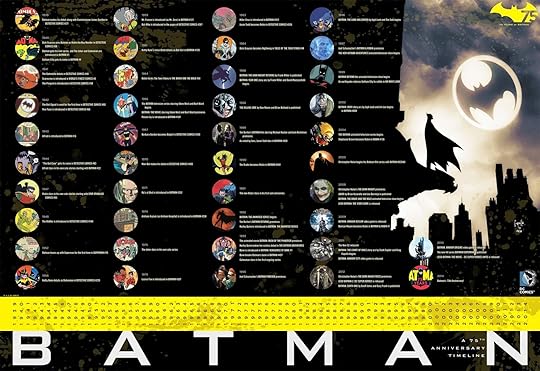
The first stories of the first nine characters/elements (Batman, Commissioner James Gordon, Robin, Joker, Catwoman, Gotham, Batmobile, Scarecrow, Penguin) on this timeline were written by Bill Finger. The first nine. The first nine.
Of the next five:
Bat-Signal—first appeared in a story credited to Jack SchiffTwo-Face—Bill did write his first story but credits Bob with the concept (some sources say Two-Face was the only villain Bob came up with…and some say that is no surprise, on two levels)Alfred—some sources credit Bill for Alfred’s first story but some (I believe correctly) credit Don CameronBatcave (originally “Bat Cave”)—this was introduced in stages (i.e. first as “underground hangers” by Bill in 1942, then in the 1943 Batman movie serial, then in a 1943 Batman comic strip written by Bill, and finally in the comics in a story credited to Don Cameron) Riddler—Bill wrote his first story and years later JuliusSchwartz acknowledged this
In other words, Bill had a hand (or was the hand) in twelve of the first fourteen milestones.
Just Fingerin’.

The first stories of the first nine characters/elements (Batman, Commissioner James Gordon, Robin, Joker, Catwoman, Gotham, Batmobile, Scarecrow, Penguin) on this timeline were written by Bill Finger. The first nine. The first nine.
Of the next five:
Bat-Signal—first appeared in a story credited to Jack SchiffTwo-Face—Bill did write his first story but credits Bob with the concept (some sources say Two-Face was the only villain Bob came up with…and some say that is no surprise, on two levels)Alfred—some sources credit Bill for Alfred’s first story but some (I believe correctly) credit Don CameronBatcave (originally “Bat Cave”)—this was introduced in stages (i.e. first as “underground hangers” by Bill in 1942, then in the 1943 Batman movie serial, then in a 1943 Batman comic strip written by Bill, and finally in the comics in a story credited to Don Cameron) Riddler—Bill wrote his first story and years later JuliusSchwartz acknowledged this
In other words, Bill had a hand (or was the hand) in twelve of the first fourteen milestones.
Just Fingerin’.
Published on June 11, 2014 04:00
June 10, 2014
Significance of Bill Finger’s name on new “Detective Comics” #27 cover
Last week, news broke that, for the first time in Batman’s 75-year history, the name of his uncredited co-creator, Bill Finger, would appear on a Batman comic book cover, the upcoming free anniversary tribute issue of Detective Comics #27.
I was so excited that I posted it immediately and without comment.
But what does it really mean? Should we be excited?
Yes.
But with realistic expectations.
Though this is indeed the first time that Bill's name has been on the cover of a comic, it is far from the first time DC Comics has credited him as writer for his stories, so it is a logical extension of what they have already done. Modern management is enlightened but also bound by old contracts. This is a way for them to demonstrate the former while honoring the latter.
But what of that fabled (infabled?) contract between DC and Bob Kane? Neither DC nor the Kane estate have made it public, which is no surprise. So while we can be nearly certain there is a contract (after all, it was a business deal), what if it does not contain a “sole creator” stipulation? Given Bob’s hubris and greediness, I am quite sure he would’ve asked for it, and since this was before creators of major superheroes were suing comics companies, I am inclined to believe that DC would have included it...but what if, for any number of reasons, they said no?
Maybe all those years, Bob was also lying about that...
DC would have no incentive to disabuse the public of the notion that such an ironclad contract existed. The less they reveal, the harder it is for anyone to raise disputes.
As was widely reported recently, Bill’s lone grandchild Athena Finger (whom I discovered in 2007 during my research for Bill the Boy Wonder: The Secret Co-Creator of Batman) issued a statement indicating that the Finger family is “not okay” with DC Comics…meaning not okay with DC not giving Bill co-creator credit on all Batman stories.
Of course I agree with that.
Some fans speculate that this inclusion of Bill’s name on the cover is a Bat-signal of a different kind: a first step to bigger, imminent change.
Of course I hope so.
But such a move makes no guarantees. Change won’t come simply because the management, as aforementioned, is enlightened. In the comics, Batman has big bank…and in real life, too. He’s a batzillion-dollar property. No matter how decision-makers at DC feel personally, nothing about something so valuable will budge without diplomacy. Or failing that, a fight.
Good thing no one is better at fighting than Batman. I just wish Bob Kane was still here to step outside...
I was so excited that I posted it immediately and without comment.
But what does it really mean? Should we be excited?
Yes.
But with realistic expectations.
Though this is indeed the first time that Bill's name has been on the cover of a comic, it is far from the first time DC Comics has credited him as writer for his stories, so it is a logical extension of what they have already done. Modern management is enlightened but also bound by old contracts. This is a way for them to demonstrate the former while honoring the latter.
But what of that fabled (infabled?) contract between DC and Bob Kane? Neither DC nor the Kane estate have made it public, which is no surprise. So while we can be nearly certain there is a contract (after all, it was a business deal), what if it does not contain a “sole creator” stipulation? Given Bob’s hubris and greediness, I am quite sure he would’ve asked for it, and since this was before creators of major superheroes were suing comics companies, I am inclined to believe that DC would have included it...but what if, for any number of reasons, they said no?
Maybe all those years, Bob was also lying about that...
DC would have no incentive to disabuse the public of the notion that such an ironclad contract existed. The less they reveal, the harder it is for anyone to raise disputes.
As was widely reported recently, Bill’s lone grandchild Athena Finger (whom I discovered in 2007 during my research for Bill the Boy Wonder: The Secret Co-Creator of Batman) issued a statement indicating that the Finger family is “not okay” with DC Comics…meaning not okay with DC not giving Bill co-creator credit on all Batman stories.
Of course I agree with that.
Some fans speculate that this inclusion of Bill’s name on the cover is a Bat-signal of a different kind: a first step to bigger, imminent change.
Of course I hope so.
But such a move makes no guarantees. Change won’t come simply because the management, as aforementioned, is enlightened. In the comics, Batman has big bank…and in real life, too. He’s a batzillion-dollar property. No matter how decision-makers at DC feel personally, nothing about something so valuable will budge without diplomacy. Or failing that, a fight.
Good thing no one is better at fighting than Batman. I just wish Bob Kane was still here to step outside...
Published on June 10, 2014 04:00
June 9, 2014
“Schoolhouse Rock” interview: singer Lori Lieberman
Introduction to the Schoolhouse Rock interview series (including the list of interviewees).
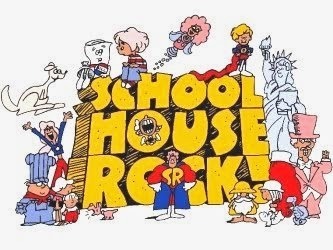
How old were you when you sang “The Great American Melting Pot” (1977)?
I was 20. It was the first time I had been hired to sing! The production company flew me from LA to NY and put me up at a nice hotel for three days.
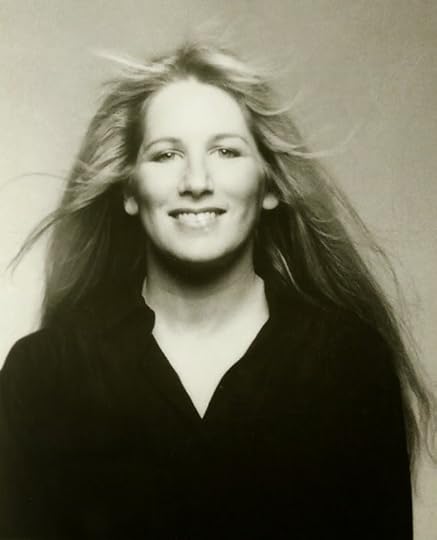
What else were you doing professionally at the time?
I had just completed my first LP for Capitol Records and was preparing to go on my first tour…it was a time of firsts!
Where were you living at the time?
Los Angeles.
Were you already aware of Schoolhouse Rock when you were hired?
I was not really aware of Schoolhouse Rock before I received their call. I had been raised in Switzerland, so it had not crossed my radar.
How were you hired?
The production team got in touch with my managers and we talked about it; it was something I was excited about.
Did you have any say in which song you got to sing?
I was presented with “The Great American Melting Pot,” which was written for my voice.
Did you make any suggestions for the song?
Absolutely not—it was perfect. Lynn Ahrens, who wrote it, was incredibly astute and kind.
Why didn’t you sing any other Schoolhouse Rock songs?
I was really busy performing and recording.
Does that mean they asked you to do more?
No, I wasn’t asked!
Any funny stories from the recording?
Gosh, I don’t remember anything during the recording of the song that was funny other than, knowing me as I was then, I always sang better with a handful of peanut M&Ms during a break—nothing like a good old fashioned milkshake, too! I broke all the rules of your more traditional rules of vocalizing!
What did you think of the song?
I thought it was great. My grandparents also came from Russia, so the song really meant something to me.
What did you think of the finished animated musical short?
I thought the animation was wonderful. It really brought it to life!
What were you paid?
I don’t really remember.
Have you had any fun Schoolhouse Rock moments since (i.e. a reaction when someone you meet discovers you had a role in it)?
Well, actually, everyone [was] pretty shocked when they realize[d] I sang the song—my children especially!
What are you doing these days?
I’m in the process of recording my 16th CD. I’ve continued to write, record, and perform. I [am touring] Europe in June 2014 and I have a big concert at Carnegie Hall on November 8th—a retrospective of my four decades in this business.
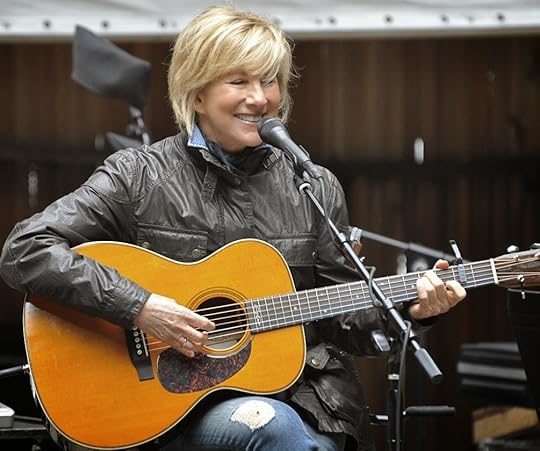
Where do you live?
California.
What did your kids think of your Schoolhouse Rock song?
I have three of my own kids and five stepkids; they [all] thought the song was great!
What has been your career highlight so far?
Besides having written a poem about seeing Don McLean at the Troubadour in LA that became [the song] “Killing Me Softly,” which I recorded on my first LP for Capitol Records, I think the highlights are performing at the beautiful and legendary theater the Carre in Amsterdam, the Grammy Museum in LA, and the upcoming Carnegie Hall performance.
What did you think when you first heard from me?
I was interested in your email about the genesis of the Schoolhouse Rock song.
Has anyone else ever interviewed about this? If so, when and for what publication?
I’ve never been interviewed about the song before.
How do you look back on the experience?
It was a great experience. The people were wonderful, the atmosphere was very professional, and I felt really good about it.
Anything you’d like to add?
Only that it’s been a pleasure revisiting the early days with you, and I look forward to connecting in the future.

How old were you when you sang “The Great American Melting Pot” (1977)?
I was 20. It was the first time I had been hired to sing! The production company flew me from LA to NY and put me up at a nice hotel for three days.

What else were you doing professionally at the time?
I had just completed my first LP for Capitol Records and was preparing to go on my first tour…it was a time of firsts!
Where were you living at the time?
Los Angeles.
Were you already aware of Schoolhouse Rock when you were hired?
I was not really aware of Schoolhouse Rock before I received their call. I had been raised in Switzerland, so it had not crossed my radar.
How were you hired?
The production team got in touch with my managers and we talked about it; it was something I was excited about.
Did you have any say in which song you got to sing?
I was presented with “The Great American Melting Pot,” which was written for my voice.
Did you make any suggestions for the song?
Absolutely not—it was perfect. Lynn Ahrens, who wrote it, was incredibly astute and kind.
Why didn’t you sing any other Schoolhouse Rock songs?
I was really busy performing and recording.
Does that mean they asked you to do more?
No, I wasn’t asked!
Any funny stories from the recording?
Gosh, I don’t remember anything during the recording of the song that was funny other than, knowing me as I was then, I always sang better with a handful of peanut M&Ms during a break—nothing like a good old fashioned milkshake, too! I broke all the rules of your more traditional rules of vocalizing!
What did you think of the song?
I thought it was great. My grandparents also came from Russia, so the song really meant something to me.
What did you think of the finished animated musical short?
I thought the animation was wonderful. It really brought it to life!
What were you paid?
I don’t really remember.
Have you had any fun Schoolhouse Rock moments since (i.e. a reaction when someone you meet discovers you had a role in it)?
Well, actually, everyone [was] pretty shocked when they realize[d] I sang the song—my children especially!
What are you doing these days?
I’m in the process of recording my 16th CD. I’ve continued to write, record, and perform. I [am touring] Europe in June 2014 and I have a big concert at Carnegie Hall on November 8th—a retrospective of my four decades in this business.

Where do you live?
California.
What did your kids think of your Schoolhouse Rock song?
I have three of my own kids and five stepkids; they [all] thought the song was great!
What has been your career highlight so far?
Besides having written a poem about seeing Don McLean at the Troubadour in LA that became [the song] “Killing Me Softly,” which I recorded on my first LP for Capitol Records, I think the highlights are performing at the beautiful and legendary theater the Carre in Amsterdam, the Grammy Museum in LA, and the upcoming Carnegie Hall performance.
What did you think when you first heard from me?
I was interested in your email about the genesis of the Schoolhouse Rock song.
Has anyone else ever interviewed about this? If so, when and for what publication?
I’ve never been interviewed about the song before.
How do you look back on the experience?
It was a great experience. The people were wonderful, the atmosphere was very professional, and I felt really good about it.
Anything you’d like to add?
Only that it’s been a pleasure revisiting the early days with you, and I look forward to connecting in the future.
Published on June 09, 2014 04:00
June 8, 2014
“Schoolhouse Rock” interview: singer Essra Mohawk
Introduction to the Schoolhouse Rock interview series (including the list of interviewees).

Essra’s Schoolhouse Rock hits:
“Interjections” (1974)“Sufferin’ ‘til Suffrage” (1975)“Mother Necessity” (1977)
How old were you when you sang the first of your three Schoolhouse Rock songs, “Interjections!”?
26.
What else were you doing professionally at the time?
I was working on my third LP which was released on Elektra/Asylum and produced by the late Tommy Sellers.
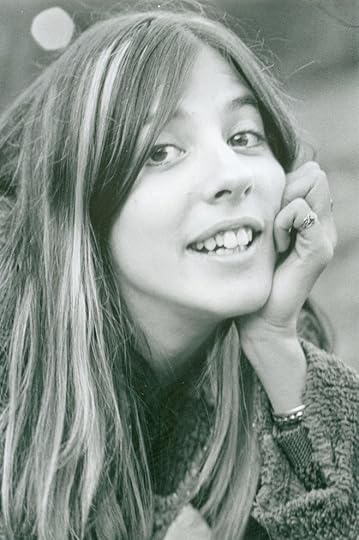
Where were you living at the time?
I moved back home to Philadelphia from L.A. in 1974 and stayed in Philly till September of ‘77 when I moved back to L.A. So from ‘74 -’77, I was doing a lot of session work in New York City. I also recorded my fourth LP in New York during that period.
Were you already aware of Schoolhouse Rock when you were hired?
You know, I don’t really remember. I believe I was. It was 40 years ago. I know I was glad to be on board!
How were you hired? Were you hired for all three of your songs at the same time?
Like I said, I was doing a lot of sessions and one producer would tell another producer about me and that’s how I got hired to sing on various projects. If they were looking for a female vocalist who could learn fast and sing with a lot of muscle in any genre with a large range, they hired me. In answer to your second question, no. I was booked to sing on three separate occasions for the three songs I sang on.
Did you have any say in which songs you got to sing?
As a hired hand, one sings what is put in front of [her]. There is no choice in such a situation. The music is very specific and worked out to go along with a storyboard that becomes the animation. A lot of time and effort goes into planning a recording session. Especially when it’s part of a network TV show. It’s not like people getting together to jam.
Did you make any suggestions for any of the songs?
I was given a lot of freedom concerning my vocal approach, but they did, after all, hire me for the way I sing. I added those really high notes at the end of the songs.
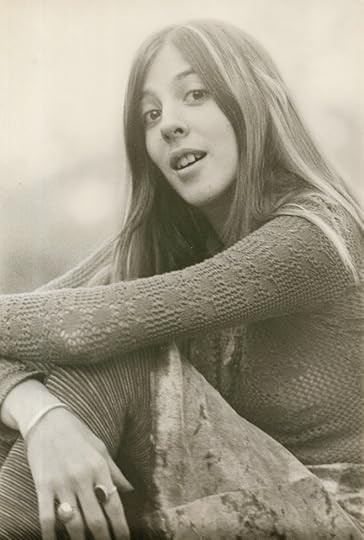
Was any song your favorite to sing?
Definitely “Sufferin’ ‘til Suffrage”! The song lent itself to my singing style and the subject matter (women’s right to vote) was something I could get passionate about!
What did you think of the finished animated musical shorts?
They always did a great job!
What were you paid?
AFTRA scale.
Have you had any fun Schoolhouse Rock moments since (i.e. a reaction when someone you meet discovers you had a role in it)?
This happens quite often, though folks are usually more impressed by the fact that I was in Frank Zappa’s band. There is one experience I had with a young girl in the neighborhood. She lives a couple doors down from me and left an invitation in my mailbox to come see her in her school’s presentation of Schoolhouse Rock. It wasn’t easy to break away from all I had on my plate at the time, but I made it a point to be there for my young neighbor’s performance. Sitting in the school auditorium watching these young children perform the songs from Schoolhouse Rock so many decades after we recorded them filled my heart and brought tears to my eyes.
What are you doing these days?
Everything I’ve always done: writing songs, recording, singing, and playing. Also, I do lots of interviews and I have a book in progress.
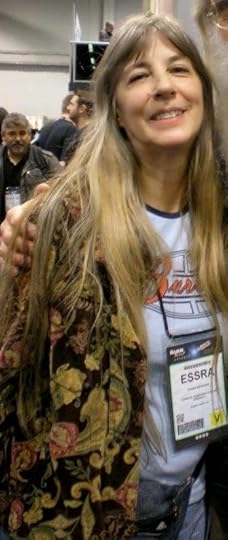
Where do you live?
Nashville.
What has been your career highlight so far?
Too many to mention. To list a few: being in the Mothers of Invention [Frank Zappa’s band], getting a top pop hit “Change of Heart” recorded by Cyndi Lauper, having one of my songs “Stronger Than the Wind” recorded by Tina Turner, playing in France and Germany, my first time performing in Europe in 2011.
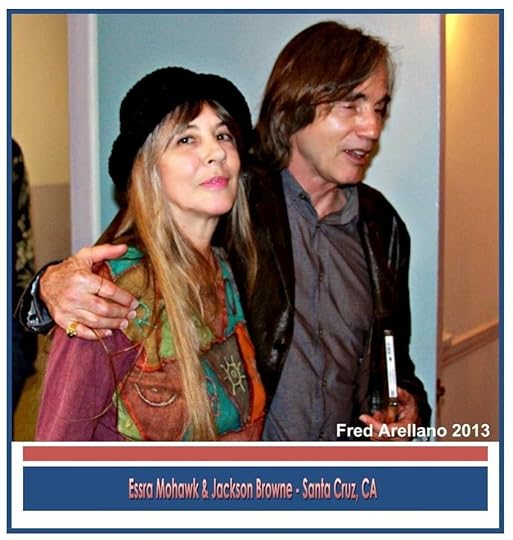
What did you think when you first heard from me?
Yet another interview. There’s so much work to do. Can I even find the time. If I got paid for these things, I’d be rich!
Has anyone else ever interviewed about this? If so, when and for what publication?
Yes. Too many to remember. Never with as many questions as you have.
How do you look back on the experience?
So busy in the present, not a lot of time to look back. Dylan said, “Don’t look back,” but sometimes I have to in order to answer journalists’ questions. Of course, I’m glad to have been a part of Schoolhouse Rock and proud that I could contribute to the education of America just by singing.
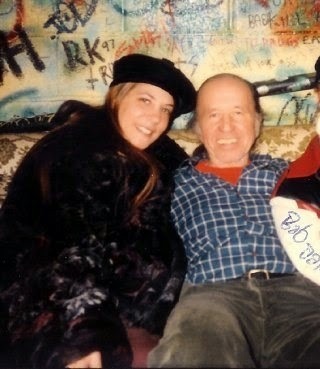 Essra and Bob Dorough 2010
Essra and Bob Dorough 2010
Next: Lori Lieberman.

Essra’s Schoolhouse Rock hits:
“Interjections” (1974)“Sufferin’ ‘til Suffrage” (1975)“Mother Necessity” (1977)
How old were you when you sang the first of your three Schoolhouse Rock songs, “Interjections!”?
26.
What else were you doing professionally at the time?
I was working on my third LP which was released on Elektra/Asylum and produced by the late Tommy Sellers.

Where were you living at the time?
I moved back home to Philadelphia from L.A. in 1974 and stayed in Philly till September of ‘77 when I moved back to L.A. So from ‘74 -’77, I was doing a lot of session work in New York City. I also recorded my fourth LP in New York during that period.
Were you already aware of Schoolhouse Rock when you were hired?
You know, I don’t really remember. I believe I was. It was 40 years ago. I know I was glad to be on board!
How were you hired? Were you hired for all three of your songs at the same time?
Like I said, I was doing a lot of sessions and one producer would tell another producer about me and that’s how I got hired to sing on various projects. If they were looking for a female vocalist who could learn fast and sing with a lot of muscle in any genre with a large range, they hired me. In answer to your second question, no. I was booked to sing on three separate occasions for the three songs I sang on.
Did you have any say in which songs you got to sing?
As a hired hand, one sings what is put in front of [her]. There is no choice in such a situation. The music is very specific and worked out to go along with a storyboard that becomes the animation. A lot of time and effort goes into planning a recording session. Especially when it’s part of a network TV show. It’s not like people getting together to jam.
Did you make any suggestions for any of the songs?
I was given a lot of freedom concerning my vocal approach, but they did, after all, hire me for the way I sing. I added those really high notes at the end of the songs.

Was any song your favorite to sing?
Definitely “Sufferin’ ‘til Suffrage”! The song lent itself to my singing style and the subject matter (women’s right to vote) was something I could get passionate about!
What did you think of the finished animated musical shorts?
They always did a great job!
What were you paid?
AFTRA scale.
Have you had any fun Schoolhouse Rock moments since (i.e. a reaction when someone you meet discovers you had a role in it)?
This happens quite often, though folks are usually more impressed by the fact that I was in Frank Zappa’s band. There is one experience I had with a young girl in the neighborhood. She lives a couple doors down from me and left an invitation in my mailbox to come see her in her school’s presentation of Schoolhouse Rock. It wasn’t easy to break away from all I had on my plate at the time, but I made it a point to be there for my young neighbor’s performance. Sitting in the school auditorium watching these young children perform the songs from Schoolhouse Rock so many decades after we recorded them filled my heart and brought tears to my eyes.
What are you doing these days?
Everything I’ve always done: writing songs, recording, singing, and playing. Also, I do lots of interviews and I have a book in progress.

Where do you live?
Nashville.
What has been your career highlight so far?
Too many to mention. To list a few: being in the Mothers of Invention [Frank Zappa’s band], getting a top pop hit “Change of Heart” recorded by Cyndi Lauper, having one of my songs “Stronger Than the Wind” recorded by Tina Turner, playing in France and Germany, my first time performing in Europe in 2011.

What did you think when you first heard from me?
Yet another interview. There’s so much work to do. Can I even find the time. If I got paid for these things, I’d be rich!
Has anyone else ever interviewed about this? If so, when and for what publication?
Yes. Too many to remember. Never with as many questions as you have.
How do you look back on the experience?
So busy in the present, not a lot of time to look back. Dylan said, “Don’t look back,” but sometimes I have to in order to answer journalists’ questions. Of course, I’m glad to have been a part of Schoolhouse Rock and proud that I could contribute to the education of America just by singing.
 Essra and Bob Dorough 2010
Essra and Bob Dorough 2010Next: Lori Lieberman.
Published on June 08, 2014 04:00
June 7, 2014
“Schoolhouse Rock” interview: songwriter Dave Frishberg
Introduction to the Schoolhouse Rock interview series (including the list of interviewees).

How old were you when you began writing for Schoolhouse Rock?
In my 40s.
What else were you doing professionally at the time?
Playing piano with bands, jazz group, singers, recording dates.
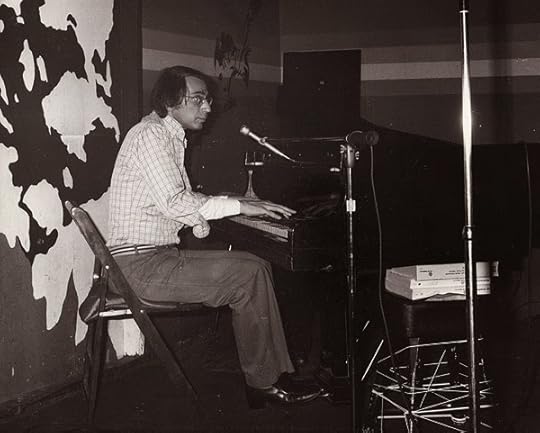 1974
1974
Where were you living at the time?
Los Angeles.
What did you think of the Schoolhouse Rock concept when you first heard it?
Anything that Bob Dorough was connected with was usually excellent.
How were you hired? Were you originally hired to write multiple songs, or just “I’m Just a Bill”?
As I recall, I was hired to write one song.
Did you have any say in which topics you got to write about?
I was usually given a choice of several topics.
Did you propose any songs/topics that were rejected?
Yes. I wrote “Prepositions Are Lonesome Words.” The topic had already been covered. [“Busy Prepositions,” 1993]
How long would it take you, on average, to write a Schoolhouse Rock song? Did you do your own research or were you presented with which facts to include?
I did my own research. Usually finished a song in 2-3 days. Dorough’s orchestrations then suited my ideas beautifully.
How hard was it to explain legislature to children in writing “I’m Just a Bill”?
I find good songs are difficult to write for both children and adults, no matter what the topic.
Which Schoolhouse Rock song you wrote was your favorite and why?
My prepositions song was my favorite. Too bad they didn’t need it.
What did you think of the finished animated musical shorts?
I was impressed with the quality of all Schoolhouse Rock products.
How were you paid—salary, flat fee per song, royalty per song, other?
Flat fee per song.
At what point did you realize “I’m Just a Bill” in particular had evolved from one of a series of an animated musical shorts into a classic of pop culture?
I regarded the whole series with respect and admiration.
Did you in any way foresee its popularity?
Of course not. It’s nearly impossible to foresee matters of popularity.
What do you consider your career highlight to date?
I have no idea. It’s a miracle that I’m still interested in music.
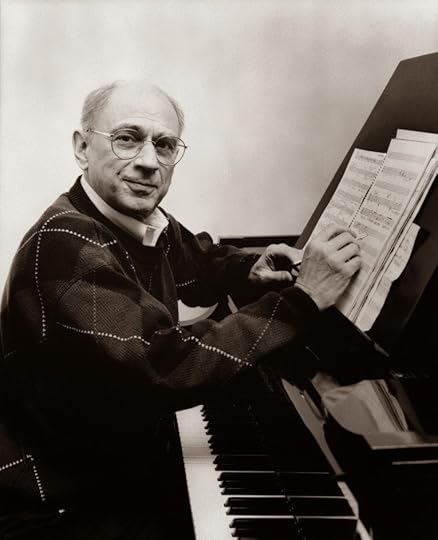
Where do you live?
Portland, OR.
If you have kids/grandkids, what did they think of your Schoolhouse Rock songs?
My kids were duly impressed. They never seemed particularly interested in my music.
Has anyone else ever interviewed about this? If so, when and for what publication?
The Schoolhouse Rock songs are mentioned in many interviews that I’ve had.
Do you still have any ongoing connection (professionally or personally) to Schoolhouse Rock?
Not really. Twenty-five or 30 years have passed. Dorough and I have been friends since long before Schoolhouse Rock existed.
Have you appeared at any fan conventions to sign autographs? If not, would you?
I would comply with appropriate requests.
What is your perspective on the longevity and legacy of Schoolhouse Rock?
Congratulations to all involved.
How do you look back on the experience?
It was fun, and we turned out a first-class product. Bob Dorough is a remarkable musician and the whole series reflects his taste and his excellence.
Anything you’d like to add?
Nope.
Next: Essra Mohawk.

How old were you when you began writing for Schoolhouse Rock?
In my 40s.
What else were you doing professionally at the time?
Playing piano with bands, jazz group, singers, recording dates.
 1974
1974Where were you living at the time?
Los Angeles.
What did you think of the Schoolhouse Rock concept when you first heard it?
Anything that Bob Dorough was connected with was usually excellent.
How were you hired? Were you originally hired to write multiple songs, or just “I’m Just a Bill”?
As I recall, I was hired to write one song.
Did you have any say in which topics you got to write about?
I was usually given a choice of several topics.
Did you propose any songs/topics that were rejected?
Yes. I wrote “Prepositions Are Lonesome Words.” The topic had already been covered. [“Busy Prepositions,” 1993]
How long would it take you, on average, to write a Schoolhouse Rock song? Did you do your own research or were you presented with which facts to include?
I did my own research. Usually finished a song in 2-3 days. Dorough’s orchestrations then suited my ideas beautifully.
How hard was it to explain legislature to children in writing “I’m Just a Bill”?
I find good songs are difficult to write for both children and adults, no matter what the topic.
Which Schoolhouse Rock song you wrote was your favorite and why?
My prepositions song was my favorite. Too bad they didn’t need it.
What did you think of the finished animated musical shorts?
I was impressed with the quality of all Schoolhouse Rock products.
How were you paid—salary, flat fee per song, royalty per song, other?
Flat fee per song.
At what point did you realize “I’m Just a Bill” in particular had evolved from one of a series of an animated musical shorts into a classic of pop culture?
I regarded the whole series with respect and admiration.
Did you in any way foresee its popularity?
Of course not. It’s nearly impossible to foresee matters of popularity.
What do you consider your career highlight to date?
I have no idea. It’s a miracle that I’m still interested in music.

Where do you live?
Portland, OR.
If you have kids/grandkids, what did they think of your Schoolhouse Rock songs?
My kids were duly impressed. They never seemed particularly interested in my music.
Has anyone else ever interviewed about this? If so, when and for what publication?
The Schoolhouse Rock songs are mentioned in many interviews that I’ve had.
Do you still have any ongoing connection (professionally or personally) to Schoolhouse Rock?
Not really. Twenty-five or 30 years have passed. Dorough and I have been friends since long before Schoolhouse Rock existed.
Have you appeared at any fan conventions to sign autographs? If not, would you?
I would comply with appropriate requests.
What is your perspective on the longevity and legacy of Schoolhouse Rock?
Congratulations to all involved.
How do you look back on the experience?
It was fun, and we turned out a first-class product. Bob Dorough is a remarkable musician and the whole series reflects his taste and his excellence.
Anything you’d like to add?
Nope.
Next: Essra Mohawk.
Published on June 07, 2014 04:00
June 6, 2014
“Schoolhouse Rock” interview: songwriter/singer Lynn Ahrens
Introduction to the Schoolhouse Rock interview series (including the list of interviewees).

Among Lynn’s greatest Schoolhouse Rock hits:
M = wrote music
L = wrote lyrics
S = sang song
“Interjections!” – ML“A Noun Is a Person, Place, or Thing” – MLS“Interplanet Janet” – MLS“The Great American Melting Pot” – ML“No More Kings” – MLS (co-sung with Bob Dorough)“The Preamble” – MLS
How old were you when you began writing for Schoolhouse Rock?
About 22.
What else were you doing professionally at the time?
I had just been hired as a secretary, working in the copy department of an advertising agency called McCaffrey and McCall. It was my first job out of college and I hoped to become a copywriter. That opportunity led to a career as a copywriter, followed by freelance careers as a TV writer (Schoolhouse Rock and many others), a jingle writer, a television producer of many network shows for young people, and ultimately a musical theatre writer. It all started there.
Where were you living at the time?
My ex-husband and I were sleeping on the floor of his sister’s apartment in Flushing, Queens. We had just arrived in NYC and were looking for jobs. (Flushing was not the New York City I had envisioned—it took me awhile to figure out where Manhattan was.) I answered two ads in the Times—one for an insurance company, one for an advertising agency. We were broke, and I would have taken the first job offered. Luckily, it was McCaffrey and McCall who offered first.
Were you already aware of Schoolhouse Rock when you were hired?
No, not at all.
How were you hired?
I took an old-fashioned typing test to get my secretarial position. Since I’ve never learned to type, I passed with my own four-finger method. I had to be shown how to use the huge Remington Selectric typewriter, complete with a self-correcting wheel. I used to bring my guitar to work and play and write songs on my lunch hour because I was bored silly as a secretary. One day one of the producers of Schoolhouse Rock, George Newall, passed by and casually asked me if I’d like to try writing a song for Schoolhouse Rock. I wrote “The Preamble,” it went on the air with me singing, and that was the beginning. It was dumb luck—being in the right place at the right time with the right person passing by.
Were you originally hired to write multiple songs, or just one?
Just one. Then they started asking for more.
Did you have any say in which topics you got to write about?
We were told the general category (American history, grammar, etc.) but we chose our own topics for the most part.
Did you propose any songs/topics that were rejected?
Don’t think so.
How long would it take you, on average, to write a Schoolhouse Rock song?
I’m a pretty fast writer. I’d guess to research and write a song would take me anywhere from a few days to a week.
Did you do your own research or were you presented with which facts to include?
Did my own.
Which Schoolhouse Rock song you wrote was your favorite and why?
I’m fond of “Interplanet Janet” because she’s an adventurous female character. (And I like the way I sound singing it.) Many years later I was asked to do a rewrite for schools because Pluto had been downgraded to a non-planet. I revised the lyrics as follows:
original: And Pluto, little Pluto, is the farthest planet Janet’s been. [in aired version, “ from our sun” replaced “Janet’s been”]
revision: And Pluto’s not a planet, but Janet thinks it should have been.
What is your favorite Schoolhouse Rock song you did not write?
I think maybe “Three Is a Magic Number.” Or maybe “Figure Eight.” They’re both beautiful.
What song you wrote (whether or not Schoolhouse Rock) is your favorite?
This is an impossible one to answer. Between television, film, theater, and concert work, my body of work is pretty big at this point.
Which Schoolhouse Rock song was your favorite to sing?
Probably “The Preamble.” It was the first one I wrote and sang and there was an incredible sense of glee standing at a microphone and learning how to use my voice.
Any funny stories from the recordings?
I once had to perform live with Bobby Dorough for an ABC-TV event called Funshine Saturday, on board a ship. I was supposed to play the guitar to accompany myself (something I had never done in performance before) and I expected there would be a stool or a chair onstage for me. There was nothing to sit on, and I had not brought a guitar strap. You try playing a guitar without a strap while standing. It is, very simply, impossible. That was my first and last public performance with a musical instrument.
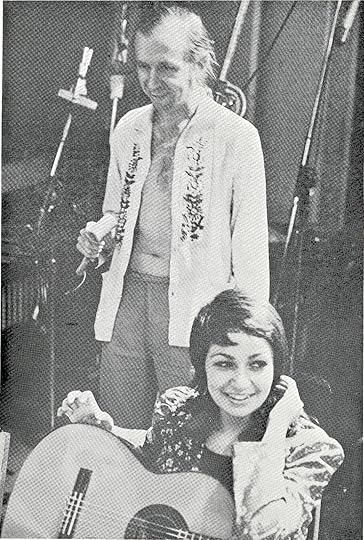 Lynn and Bob recording “A Noun Is a Person, Place, or Thing”; photo courtesy of George Newall
Lynn and Bob recording “A Noun Is a Person, Place, or Thing”; photo courtesy of George Newall
What did you think of the finished animated musical shorts?
I thought they were brilliant—so simple and so witty, even with very limited animation.
What are your most cherished/funniest Schoolhouse Rock stories since (a reaction when someone you meet discovers you had a role in it, seeing its influence in an unexpected way, hearing a celeb you admire sing its praises, etc.)?
When I speak to theater students at colleges—people who want to become serious musical theater writers or performers—the biggest response to my bio usually comes for Schoolhouse Rock, followed closely by “What Would You Do For a Klondike Bar.” These seem to be cultural touchstones.
What are you working on these days?
[Recently] opened the musical Rocky on Broadway, now running at the Winter Garden Theatre. Will be premiering an original musical called Little Dancer at the Kennedy Center this coming fall, directed by Susan Stroman. And following that I’ll be premiering another new musical, based on the animated film Anastasia. (I wrote the original songs for the movie in 1998.)
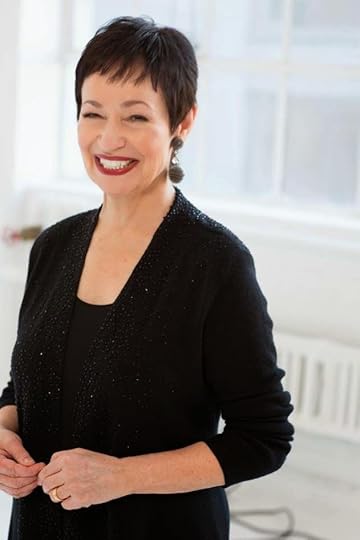
What do you consider your career highlight to date?
Going to the Oscars for Anastasia was pretty amazing. Getting Rocky to Broadway via Hamburg, Germany has been life-changing. Ragtime, Once on This Island, and Seussical were all extraordinary experiences, for very different reasons. And of course Schoolhouse Rock, which made me a professional songwriter.
Where do you live?
New York.
What did you think when you first heard from me?
That you were confused about my having a son! [MTN: I read that here.]
Has anyone else ever interviewed about this? If so, when and for what publication?
Many times, and honestly I don’t recall where or when.
Do you still have any ongoing connection (professionally or personally) to Schoolhouse Rock?
I have both. Just had lunch with Bobby Dorough, George Newall, and Rad Stone to celebrate Bobby’s 90th birthday (!). And a couple of years ago, I provided four new songs, one of which was a sequel to “Interplanet Janet.”
Have you appeared at any fan conventions to sign autographs? If not, would you?
No, and probably wouldn’t.
Anyone else connected with Schoolhouse Rock you suggest I interview?
I’m sure you know the key—George Newall, Rad Stone, Bobby Dorough and myself. Tom Yohe and Jack Sidebotham are sadly both gone, but Tom’s son (Tom Jr.) designed some of the most recent ones, and draws in a style very similar to his dad’s. Interestingly, when he was a little boy, Tom Jr. did one of the kid’s voices on my song “Interjections!” and his young son, Tommy III, sang on one of those recent ones I mentioned. So there are three generations of Tom Yohes associated with the show.
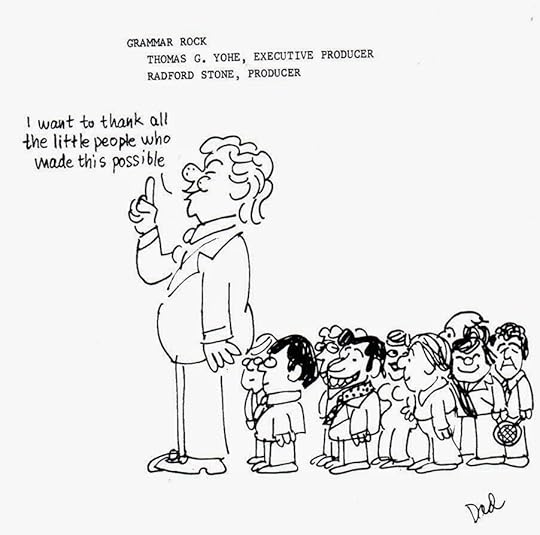
What is your perspective on the longevity and legacy of Schoolhouse Rock?
It’s a beautiful show that has withstood the test of time and will continue to do so because it’s completely unaffected and innocent at heart. It amazes me how many different generations have been touched by the show.
How do you look back on the experience?
Schoolhouse Rock taught me how to write songs on assignment, work with actors, work in a studio, record music, mix tracks, work with film and sound effects. It gave me the courage to go freelance as a young songwriter. Basically, it set me on the road to here.
Next: Dave Frishberg.

Among Lynn’s greatest Schoolhouse Rock hits:
M = wrote music
L = wrote lyrics
S = sang song
“Interjections!” – ML“A Noun Is a Person, Place, or Thing” – MLS“Interplanet Janet” – MLS“The Great American Melting Pot” – ML“No More Kings” – MLS (co-sung with Bob Dorough)“The Preamble” – MLS
How old were you when you began writing for Schoolhouse Rock?
About 22.
What else were you doing professionally at the time?
I had just been hired as a secretary, working in the copy department of an advertising agency called McCaffrey and McCall. It was my first job out of college and I hoped to become a copywriter. That opportunity led to a career as a copywriter, followed by freelance careers as a TV writer (Schoolhouse Rock and many others), a jingle writer, a television producer of many network shows for young people, and ultimately a musical theatre writer. It all started there.
Where were you living at the time?
My ex-husband and I were sleeping on the floor of his sister’s apartment in Flushing, Queens. We had just arrived in NYC and were looking for jobs. (Flushing was not the New York City I had envisioned—it took me awhile to figure out where Manhattan was.) I answered two ads in the Times—one for an insurance company, one for an advertising agency. We were broke, and I would have taken the first job offered. Luckily, it was McCaffrey and McCall who offered first.
Were you already aware of Schoolhouse Rock when you were hired?
No, not at all.
How were you hired?
I took an old-fashioned typing test to get my secretarial position. Since I’ve never learned to type, I passed with my own four-finger method. I had to be shown how to use the huge Remington Selectric typewriter, complete with a self-correcting wheel. I used to bring my guitar to work and play and write songs on my lunch hour because I was bored silly as a secretary. One day one of the producers of Schoolhouse Rock, George Newall, passed by and casually asked me if I’d like to try writing a song for Schoolhouse Rock. I wrote “The Preamble,” it went on the air with me singing, and that was the beginning. It was dumb luck—being in the right place at the right time with the right person passing by.
Were you originally hired to write multiple songs, or just one?
Just one. Then they started asking for more.
Did you have any say in which topics you got to write about?
We were told the general category (American history, grammar, etc.) but we chose our own topics for the most part.
Did you propose any songs/topics that were rejected?
Don’t think so.
How long would it take you, on average, to write a Schoolhouse Rock song?
I’m a pretty fast writer. I’d guess to research and write a song would take me anywhere from a few days to a week.
Did you do your own research or were you presented with which facts to include?
Did my own.
Which Schoolhouse Rock song you wrote was your favorite and why?
I’m fond of “Interplanet Janet” because she’s an adventurous female character. (And I like the way I sound singing it.) Many years later I was asked to do a rewrite for schools because Pluto had been downgraded to a non-planet. I revised the lyrics as follows:
original: And Pluto, little Pluto, is the farthest planet Janet’s been. [in aired version, “ from our sun” replaced “Janet’s been”]
revision: And Pluto’s not a planet, but Janet thinks it should have been.
What is your favorite Schoolhouse Rock song you did not write?
I think maybe “Three Is a Magic Number.” Or maybe “Figure Eight.” They’re both beautiful.
What song you wrote (whether or not Schoolhouse Rock) is your favorite?
This is an impossible one to answer. Between television, film, theater, and concert work, my body of work is pretty big at this point.
Which Schoolhouse Rock song was your favorite to sing?
Probably “The Preamble.” It was the first one I wrote and sang and there was an incredible sense of glee standing at a microphone and learning how to use my voice.
Any funny stories from the recordings?
I once had to perform live with Bobby Dorough for an ABC-TV event called Funshine Saturday, on board a ship. I was supposed to play the guitar to accompany myself (something I had never done in performance before) and I expected there would be a stool or a chair onstage for me. There was nothing to sit on, and I had not brought a guitar strap. You try playing a guitar without a strap while standing. It is, very simply, impossible. That was my first and last public performance with a musical instrument.
 Lynn and Bob recording “A Noun Is a Person, Place, or Thing”; photo courtesy of George Newall
Lynn and Bob recording “A Noun Is a Person, Place, or Thing”; photo courtesy of George NewallWhat did you think of the finished animated musical shorts?
I thought they were brilliant—so simple and so witty, even with very limited animation.
What are your most cherished/funniest Schoolhouse Rock stories since (a reaction when someone you meet discovers you had a role in it, seeing its influence in an unexpected way, hearing a celeb you admire sing its praises, etc.)?
When I speak to theater students at colleges—people who want to become serious musical theater writers or performers—the biggest response to my bio usually comes for Schoolhouse Rock, followed closely by “What Would You Do For a Klondike Bar.” These seem to be cultural touchstones.
What are you working on these days?
[Recently] opened the musical Rocky on Broadway, now running at the Winter Garden Theatre. Will be premiering an original musical called Little Dancer at the Kennedy Center this coming fall, directed by Susan Stroman. And following that I’ll be premiering another new musical, based on the animated film Anastasia. (I wrote the original songs for the movie in 1998.)

What do you consider your career highlight to date?
Going to the Oscars for Anastasia was pretty amazing. Getting Rocky to Broadway via Hamburg, Germany has been life-changing. Ragtime, Once on This Island, and Seussical were all extraordinary experiences, for very different reasons. And of course Schoolhouse Rock, which made me a professional songwriter.
Where do you live?
New York.
What did you think when you first heard from me?
That you were confused about my having a son! [MTN: I read that here.]
Has anyone else ever interviewed about this? If so, when and for what publication?
Many times, and honestly I don’t recall where or when.
Do you still have any ongoing connection (professionally or personally) to Schoolhouse Rock?
I have both. Just had lunch with Bobby Dorough, George Newall, and Rad Stone to celebrate Bobby’s 90th birthday (!). And a couple of years ago, I provided four new songs, one of which was a sequel to “Interplanet Janet.”
Have you appeared at any fan conventions to sign autographs? If not, would you?
No, and probably wouldn’t.
Anyone else connected with Schoolhouse Rock you suggest I interview?
I’m sure you know the key—George Newall, Rad Stone, Bobby Dorough and myself. Tom Yohe and Jack Sidebotham are sadly both gone, but Tom’s son (Tom Jr.) designed some of the most recent ones, and draws in a style very similar to his dad’s. Interestingly, when he was a little boy, Tom Jr. did one of the kid’s voices on my song “Interjections!” and his young son, Tommy III, sang on one of those recent ones I mentioned. So there are three generations of Tom Yohes associated with the show.

What is your perspective on the longevity and legacy of Schoolhouse Rock?
It’s a beautiful show that has withstood the test of time and will continue to do so because it’s completely unaffected and innocent at heart. It amazes me how many different generations have been touched by the show.
How do you look back on the experience?
Schoolhouse Rock taught me how to write songs on assignment, work with actors, work in a studio, record music, mix tracks, work with film and sound effects. It gave me the courage to go freelance as a young songwriter. Basically, it set me on the road to here.
Next: Dave Frishberg.
Published on June 06, 2014 04:00



